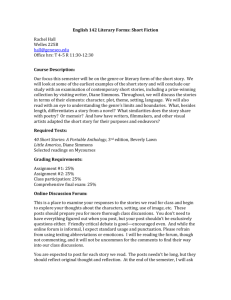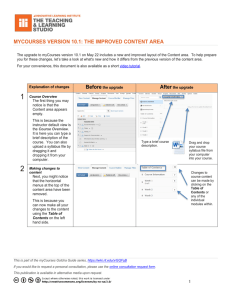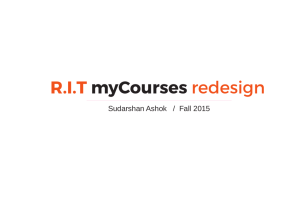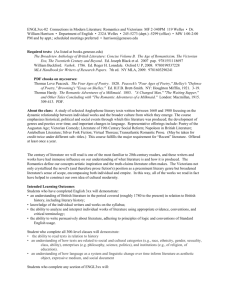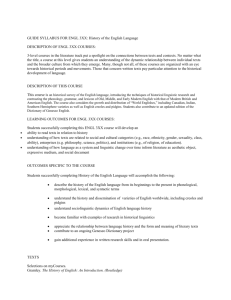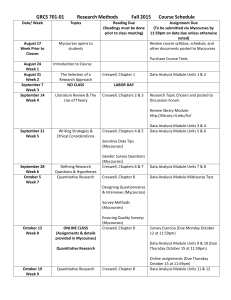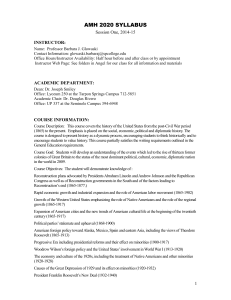HUMN 221syllabus_s15 - Geneseo Wiki
advertisement
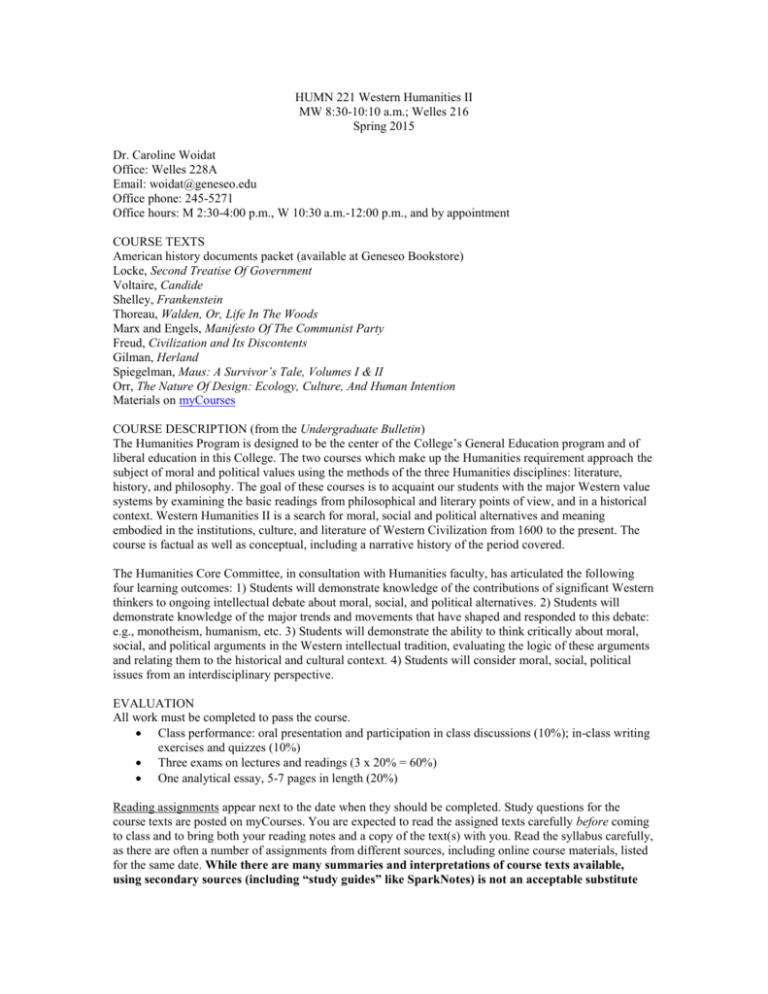
HUMN 221 Western Humanities II MW 8:30-10:10 a.m.; Welles 216 Spring 2015 Dr. Caroline Woidat Office: Welles 228A Email: woidat@geneseo.edu Office phone: 245-5271 Office hours: M 2:30-4:00 p.m., W 10:30 a.m.-12:00 p.m., and by appointment COURSE TEXTS American history documents packet (available at Geneseo Bookstore) Locke, Second Treatise Of Government Voltaire, Candide Shelley, Frankenstein Thoreau, Walden, Or, Life In The Woods Marx and Engels, Manifesto Of The Communist Party Freud, Civilization and Its Discontents Gilman, Herland Spiegelman, Maus: A Survivor’s Tale, Volumes I & II Orr, The Nature Of Design: Ecology, Culture, And Human Intention Materials on myCourses COURSE DESCRIPTION (from the Undergraduate Bulletin) The Humanities Program is designed to be the center of the College’s General Education program and of liberal education in this College. The two courses which make up the Humanities requirement approach the subject of moral and political values using the methods of the three Humanities disciplines: literature, history, and philosophy. The goal of these courses is to acquaint our students with the major Western value systems by examining the basic readings from philosophical and literary points of view, and in a historical context. Western Humanities II is a search for moral, social and political alternatives and meaning embodied in the institutions, culture, and literature of Western Civilization from 1600 to the present. The course is factual as well as conceptual, including a narrative history of the period covered. The Humanities Core Committee, in consultation with Humanities faculty, has articulated the following four learning outcomes: 1) Students will demonstrate knowledge of the contributions of significant Western thinkers to ongoing intellectual debate about moral, social, and political alternatives. 2) Students will demonstrate knowledge of the major trends and movements that have shaped and responded to this debate: e.g., monotheism, humanism, etc. 3) Students will demonstrate the ability to think critically about moral, social, and political arguments in the Western intellectual tradition, evaluating the logic of these arguments and relating them to the historical and cultural context. 4) Students will consider moral, social, political issues from an interdisciplinary perspective. EVALUATION All work must be completed to pass the course. Class performance: oral presentation and participation in class discussions (10%); in-class writing exercises and quizzes (10%) Three exams on lectures and readings (3 x 20% = 60%) One analytical essay, 5-7 pages in length (20%) Reading assignments appear next to the date when they should be completed. Study questions for the course texts are posted on myCourses. You are expected to read the assigned texts carefully before coming to class and to bring both your reading notes and a copy of the text(s) with you. Read the syllabus carefully, as there are often a number of assignments from different sources, including online course materials, listed for the same date. While there are many summaries and interpretations of course texts available, using secondary sources (including “study guides” like SparkNotes) is not an acceptable substitute for doing your own critical reading and thinking. Moreover, representing someone else’s ideas or words as if they are one’s own—whether on a quiz, exam, or in a paper—constitutes plagiarism. Quizzes and in-class writing exercises will be given at the beginning of class periods. These are designed not merely to check whether you’ve been reading, but also to spark questions and comments for the day’s discussion. Although it is not possible to make up a quiz or writing exercise that you miss, you will be able to drop one of these grades at the end of the semester. Responses will be evaluated for the sophistication of your analysis and your ability to use and identify details from the texts. Vague responses will not earn satisfactory marks; you need to demonstrate your familiarity with the text by incorporating specific references into your answer. The quizzes and in-class exercises will allow you to practice and develop your writing skills for exams and papers. Class performance is critical to our work in this course and thus a significant component of your final grade. Your participation will be monitored for its consistency and quality. Good preparation and ongoing engagement in discussions are necessary to earn a grade of B or higher. Frequent absences, lack of preparation, lack of involvement, inattention and/or distracting behavior (such as texting or other inappropriate use of electronic devices) will negatively affect the participation grade. Laptops and cell phones should not be used during class discussions, which require the attention and involvement of all students. Every student should be prepared to join in class conversations, and to communicate, discuss, and debate ideas in ways that respect the diversity of the community. In addition to day-to-day participation, each student will be responsible for one short group oral presentation that explores what is at stake in the day’s assigned reading. Students will sign up for topics in small groups and conduct research in order to introduce a specific context for reading a text—that is, to locate the text in larger, ongoing debates surrounding a particular issue. A presentation schedule with guidelines will be reviewed in class and posted on myCourses. Essays are due in class and to Turnitin.com on the due date; email attachments will not be accepted. Papers should be typed and stapled, using double-spacing, 1-inch margins and a legible 12-point font (e.g., Times New Roman). Be sure to include page numbers and a title. You should support your essay’s claims with textual evidence (including direct quotations) and cite sources using the MLA style of documentation— with parenthetical references and a "Works Cited" page at the end of your essay. The paper will be evaluated for the sophistication and presentation of your argument. A late paper will accrue a penalty for each day that it is late and will not be accepted over seven days late without a certified excuse from the Dean of Students. Topics and guidelines will be discussed in class and posted on myCourses. Exams are essay format and will be discussed further in class so that you know what to expect and how to prepare for them. No make-up exams will be scheduled unless there are documented extenuating circumstances (e.g. severe illness or family crisis). It is the student’s responsibility to contact the professors as far in advance as possible to request alternative arrangements to a scheduled exam time. COLLEGE POLICIES OF NOTE SUNY Geneseo will make reasonable accommodations for persons with documented physical, emotional, or cognitive disabilities. Accommodations will also be made for medical conditions related to pregnancy or parenting. Students should contact Dean Buggie-Hunt in the Office of Disability Services (245-5112 or tbuggieh@geneseo.edu) and their faculty to discuss needed accommodations as early as possible in the semester. It is essential to give credit to sources of any ideas that are not your own, as plagiarism is a serious offense with severe consequences. Each student is responsible for knowing what constitutes plagiarism and understanding the college’s policy and procedures for academic dishonesty. For more information, see Student Handbook, Milne Library’s guide to avoiding plagiarism, and/or attend one of the plagiarism workshops scheduled throughout the semester at Milne. SUNY-Geneseo holds among its core values the ideals of community and diversity. I am a participant in the Geneseo Safe Zone program that reflects these values, particularly as they pertain to sexual diversity. SCHEDULE 1/21 Introduction to course; Baron, “How E-Reading Threatens Learning in the Humanities” (myCourses) 1/26 Locke, Second Treatise (ch. I-V); Cronon, “Bounding the Land” (myCourses) 1/28 Locke, Second Treatise (ch. VI-XI) 2/2 Locke, Second Treatise (ch. XII-XIX) 2/4 Voltaire, Voltaire, Candide (ch. 1-18 & appendix 2, including endnotes and footnotes) 2/9 Voltaire, Voltaire, Candide (ch. 19-30 & appendix 3, including endnotes and footnotes) 2/11 American History Documents: Declaration of Independence, Federalist Papers, Anti-Federalist Speeches and Writings, Constitution of the United States, Bill of Rights, Iroquois Constitution 2/16 Shelley, Frankenstein (author’s introduction – ch. 16) 2/18 Shelley, Frankenstein (ch. 17-24) 2/23 Exam #1 2/25 American History Documents: Martineau, “Political Non-Existence of Women”; Douglass, “The Fourth of July”; Lincoln, “Address at Gettysburg” and “Second Inaugural Address”; Declaration of Sentiments (myCourses); Mohawk, “Indian Nations, the United States, and Citizenship” (myCourses) 3/2 Thoreau, Walden (Chapters 1-4: Economy, Where I Lived, and What I Lived For, Reading, Sounds) 3/4 Thoreau, Walden (Chapters 5-11: Solitude, Visitors, The Bean-Field, The Village, The Ponds, Baker Farm, Higher Laws) 3/9 Thoreau, Walden (Chapters 16-18: The Pond in Winter, Spring, Conclusion); Alcott, “Transcendental Wild Oats” (myCourses); Stanton, “The Solitude of Self” (myCourses) 3/11 Marx and Engels, The Communist Manifesto (all) Spring break 3/23 Gilman, Herland (ch. 1-8) 3/25 Gilman, Herland (ch. 9-12); Orr, The Nature of Design (ch. 1-2) 3/30 Orr, The Nature of Design (ch. 3-13) 4/1 Orr, The Nature of Design (ch. 14-21) 4/6 Exam #2 4/8 Freud, Civilization and its Discontents (ch. 1-4) 4/13 Freud, Civilization and its Discontents (ch. 5-8); Cather, “Paul’s Case” (myCourses) 4/15 Spiegelman, Maus: A Survivor’s Tale (Vol. I: ch. 1-4) 4/20 Spiegelman, Maus: A Survivor’s Tale (Vol. I: ch. 5-6 & Vol. II: ch. 1) 4/22 Spiegelman, Maus: A Survivor’s Tale (Vol. II: ch. 2-5) 4/27 The Defiant Ones (film); paper due 4/29 Discussion of The Defiant Ones; King, “Letter from Birmingham Jail” (myCourses); Baldwin, from The Devil Finds Work (myCourses); McIntosh, “White Privilege—Unpacking the Invisible Knapsack” (myCourses); Braden, “Finding the Other America” (myCourses) 5/4 Coates, “The Case for Reparations” (myCourses); Mohawk, “Racism: An American Ideology” (myCourses) 5/12 Final exam (8:00-11:00 a.m.)
